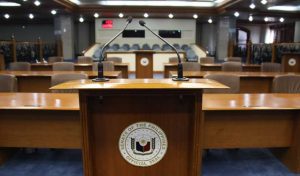
Senate’s CREATE MORE bill could open doors to fuel smuggling — IBON
By John Victor D. Ordoñez, Reporter
THE SENATE version of the Corporate Recovery and Tax Incentives for Enterprises to Maximize Opportunities for Reinvigorating the Economy (CREATE MORE) bill, which allows value-added tax (VAT)-free importation of fuel for international carriers, could worsen oil smuggling, an economist said.
“Apart from creating even more liberal opportunities for smuggling, it is a revenue loss in itself, just when the government should be earning more to finance so many needed interventions, as well as a bias against domestic carriers,” IBON Foundation Executive Director Jose Enrique “Sonny” A. Africa said in a Viber message at the weekend.
“Creating a more productive work force and favorable domestic industrial ecosystem is a much more development-oriented approach for competitiveness than mere fiscal incentives,” he added
Albay Rep. Jose Maria Clemente “Joey” S. Salceda, who heads the House of Representatives ways and means committee, last week cited the clause as one of the priority measure’s flaws that needed to be corrected at a bicameral conference committee.
Senator Sherwin T. Gatchalian, who sponsored Senate Bill No. 2762 or the CREATE MORE bill, did not immediately reply to a Viber message seeking comment.
The measure, which is in the period of amendments at the Senate, exempts international carriers from paying VAT on imported fuel, goods and supplies used for international shipping or air transport operations.
“We vehemently object to this,” Mr. Salceda said in a statement on Thursday. “Such products will not be fuel-marked when imported, so the Senate proposal will confuse law enforcement as to the provenance of unmarked fuel.”
He added that the smuggled products from Customs-bonded warehouses had cost the government about P357 billion in foregone revenues from 2010 to 2019.
“We cannot agree to something we have already found in our own investigations to be a policy that creates and allows smuggling,” the congressman said.
The Senate is likely to approve the measure on second and third reading this week, Senate President Francis “Chiz” G. Escudero told a news briefing last week. The House passed its version of the bill on final reading in March.
“When crafting the CREATE MORE bill, senators should consider factors such as the potential impact on government revenue, the competitiveness of the tax rates compared with neighboring countries, and the specific needs of different industries,” Jonathan L. Ravelas, senior adviser at professional service firm Reyes Tacandong & Co., said in a Viber message.
The bill lowers income taxes on domestic and foreign companies to 20% from 25% and removes VAT on goods and services in essential areas such as janitorial, security, financial consultancy, marketing and human resources.
Registered business enterprises will also be subject to a 2% local business tax based on their gross sales, while giving these companies 100% additional deduction on power expenses incurred in a taxable year to address high power costs.
The measure also allows local companies to implement a work-from-home setup for up to 50% of their workforce to cut costs.
It also transfers the responsibility of processing VAT refund claims to the Department of Finance from the Bureau of Internal Revenue (BIR) to reduce delays.
“Fairness can be maintained by ensuring that the benefits of tax reductions are equitably distributed across various sectors and business sizes,” Mr. Ravelas said.
“Ensuring fiscal sustainability involves balancing tax cuts with measures to prevent revenue loss, such as broadening the tax base or improving tax compliance,” he added.



